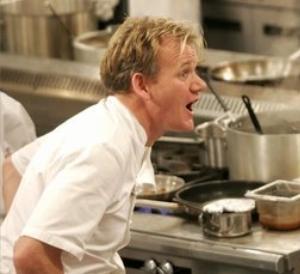Not long ago I was out at Graham Lelliott's and stayed at his house. We were watching the tube when he asked me if I'd ever seen this guy (or goy; Graham has that great British accent) named Gordon Ramsay.
Ramsay is a chef and his show is called Kitchen Nightmares. I was hooked. Not because it's a cooking show, which it isn't, but because it's a business show in disguise.
Chef Ramsay visits a restaurant and looks at the food, systems, staffing, management, physical plant and communication. Of course, the place is a nightmare -hence the name. But these are not some dumps, they look like nice places but they're in trouble. So, what's my point?
If a person like him with karate know-how went into a martial arts studio you'd have the same show.
Here's the Ramsay formula. He introduces himself (obviously he's been invited so he has a camera crew and as you see the make-overs you know there's been a lot of planning) and he samples the food. Typically it's disgusting and he then meest with the staff and asks some questions. Then he goes back into the kitchen to see what's what. Next day he goes thru the food prep and storage and watches how the back-end of the place works. Or doesn't work, really.
He then creates a plan to turn the place around. It involves changing the menu, the staff, the decor and when changes happen, the reactions are interesting. He usually installs some good operating principles and the business turns around. Sometimes they fail and it's often because the owner is not truly committed to doing what it takes to be successful.
I asked Steve White if he watched this show and he responded with an enthusiastic "yes". Steve owns one of the top studios in the US.
Here's my analogy. A consultant comes to your school and watches what goes on there. They see how a class is run by the instructors (they would be your waiters, the people actually delivering the product). They look at your studio layout, cleanliness, equipment, etc (that would be your kitchen). Does your chef communicate with the other kitchen workers? That is, does your lead instructor have the communication skills to lead assistants and get the message across to students?
How does management (the studio owner) work with the instructors? Do they have staff meetings? Ramsey shows that often an owner has never had one with their people. Is the menu (curriculum) manageable? And who is responsible for what?
His show illustrates some of the bad attitudes owners can have toward customers. Some even call their customers liars when they send food back! His point is that sometimes we have to look inward to discover our business problems.
I could go on but if you watch the show and think about what he's doing in the context of a karate school , or any business, you'll recognize sound business principles couched in an entertaining hour.
In the past I have gone to some schools and done similar things and have gotten postive feedback on recommended changes. The results are the proof. There are martial arts consultants out there who do what Ramsay does but just doesn't get bleeped as much.
Check it out.











